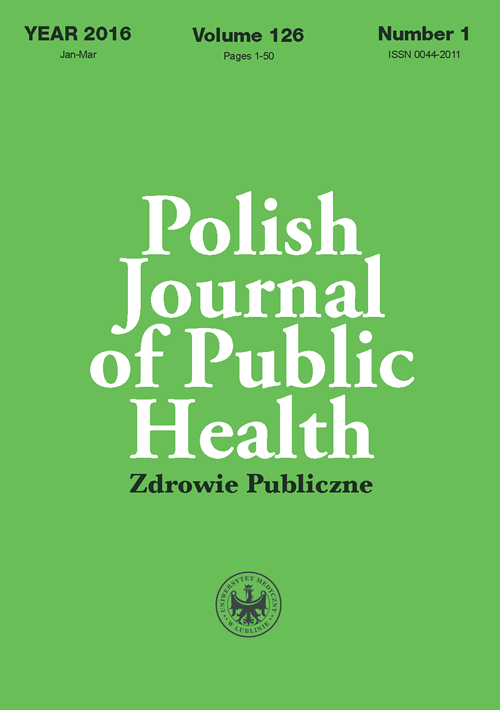Distribution of injuries among patients of Department of Trauma and Emergency Medicine of Independent Public Teaching Hospital No. 1 in 2011
DOI:
https://doi.org/10.1515/pjph-2016-0008Keywords:
injury, epidemiology, blunt injury, penetrating injuryAbstract
Introduction. Injuries are an extremely important public health problem, in both developed and developing countries. Various traumas contribute to some one third of deaths of the entire human population followed by cardiovascular diseases and cancer only. Understanding the epidemiology of trauma might improve hospitals’ ability to provide proper diagnoses and treatment.
Aim. The aim of this study was to provide epidemiological characteristics of injuries in the analyzed group of patients.
Material and methods. A retrospective analysis of patients admitted in state of emergency and hospitalized in the Department of Trauma Surgery and Emergency Medicine at the Medical University of Lublin due to injuries that occurred from January 1st 2011 till December 31st 2011 was conducted. Mechanism of injury, mortality rate, age and gender correlations were studied.
Results. Some 485 patients were looked at in the study. The mortality rate reached 4.52% and was highest among males. Falling was the leading cause of injuries among patients
Discussion. The results of this study correspond with the observations of other authors concerning the age distribution. Mortality rates noticed in this study were lower than in other studies.
Conclusions. Trauma in elderly patients is a growing problem in trauma centers. Moreover, in the analyzed material incidence of blunt and non-transport related injuries increased.
References
1. Heron M. Deaths: Leading Causes for 2012. Natl Vital Stat Rep. 2015;64:1-93.
2. Sanchez JI, Paidas CN. Childhood trauma. Now and in the new millennium. Surg Clin North Am. 1999;79:1503-35.
3. Heim C, Bosisio F, Roth A, et al. Is trauma in Switzerland any different? Epidemiology and patterns of injury in major trauma - a 5-year review from a Swiss trauma centre. Swiss Med Wkly. 2014;144:w13958.
4. Gowing R, Jain MK. Injury patterns and outcomes associated with elderly trauma victims in Kingston, Ontario. Can J Surg. 2007;50:437-44.
5. Ciesla, DJ, Pracht EE, Tepas JJ 3rd, et al. The injured elderly: a rising tide. Surgery. 2013;154:291-8.
6. Runyan, CW, Perkis D, Marshall SW, et al. Unintentional injuries in the home in the United States Part II: morbidity. Am J Prev Med. 2005;28:80-7.
7. MacKenzie, EJ, Frederick P, Rivera MD, et al. A national evaluation of the effect of trauma-center care on mortality. N Engl J Med. 2006;354:366-78.
Downloads
Published
Issue
Section
License
Copyright (c) 2016 Polish Journal of Public Health

This work is licensed under a Creative Commons Attribution-NonCommercial-NoDerivatives 3.0 Unported License.


